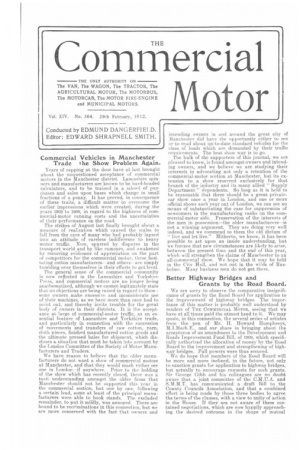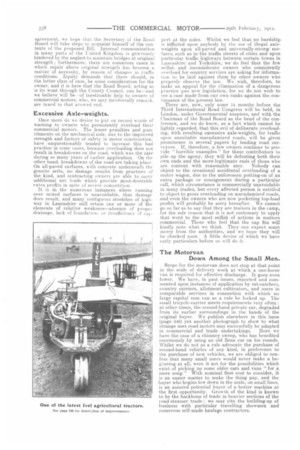Commercial Vehicles in Manchester Trade i he Show Problem Again.
Page 1

Page 2

If you've noticed an error in this article please click here to report it so we can fix it.
Years of rapping at the door have at last brought about the unquestioned acceptance of commercial motors in the Manchester district. Lancashire spin ners and manufacturers are known to be hard-headed calculators, and to be trained in a school of purchases and sales upon bases which change in small fractions of a penny. It has proved, in consequence of these traits, a difficult matter to overcome the earlier impressions which were created, during the years 1902 to 1906, in regard to the highness of commercial-motor running costs and the uncertainties of their performance on the road. The strikes of August last, finally brought about a measure of realization which caused the scales to fall from the eyes of many who had probably lapsed into an attitude of careless indifference to heavy motor traffic. Now, spurred by disputes in the transport world and by like rumours, and awakened by recurring evidences of appreciation on the part. of competitors for the commercial motor, these hesiuting cotton manufacturers—and othersare simply tumbling over themselves in their efforts to get level.
The general sense of the commercial community is now reflected in the Lancashire and Yorkshire Press, and commercial motors are no longer being anathematized, although we cannot legitimately state that no objections are being raised in regard to them : some owners make excessive and inconsiderate use of their machines, as we have more than once had to point out, and thereby invite trouble for the great body of owners in their districts. It is the acceptance at large of commercial-motor traffic, as an essential feature of Lancashire and Yorkshire trade, and particularly in connection with the succession of movements and transfers of raw cotton, yarn, cloth pieces, finished manufactured cotton goods and the ultimate pressed bales for shipment, which discloses a situation that must be taken into account by the London Committee of the Society of Motor Manufacturers and Traders.
We have reason to believe that the older manufacturers do not want a show of commercial motors at Manchester, and that they would much rather see one in London--if anywhere. Prior to the holding of the show which has recently closed, there was a tacit understanding amongst the older firms that Manchester should not, be supported this year in the commercial section, but one by one, following a certain lead, some at least of the principal manufacturers were able to book stands. The excluded remainder, to put it mildly, was annoyed. There are bound to be recriminations in this connection, but we are more concerned with the fact that owners and intending owners in and around the great city of Manchester did have the opportunity either to see or to read about up-to-date standard vehicles for the ‘is class of loads which are demanded by their tra,ffic requirements. The best show way is to go.
The bulk of the supporters of this journal, we are pleased to know, is found amongst owners and intend ing owners, and we believe we are studying their interests in advocating not only a retention of the commercial-motor section at Manchester, but its ex tension to a show reserved exclusively for that branch of the. industry and its many allied " Supply Department " dependents. So long as it is held to be reasonable that there should be a great privatecar show once a, year in London, and one or more official shows each year out of London, we can see no means of substantiating the case for suppression of newcomers in the manufacturing ranks on the commercial-motor side. Preservation of the interests of the men in possession—the older manufacturers—is not a winning argument. They are doing very well indeed, and we commend to them the old dictum of " live and let live." Hitherto, we know, it has been possible to act upon an inside understanding, but we foresee that new circumstances are likely to arise, between the present time and the end of this year, which will strengthen the claims of Manchester to an all-commercial show. We hope that it may be held in the City Hall, and not out in the wilds of Rusholme. Many business men do not get there.
Better Highway Bridges and Grants by the Road Board.
We are sorry to observe the comparative insignificance of grants by the Road Board for application to the improvement of highway bridges. The importance of this matter is probably well understood by readers of THE COMMERCIAL MOTOR, seeing that we have at all times paid the utmost heed to it,. We may quote, in this connection, the several series of articles from the pen of Mr. H. Howard Humphreys, M.I.Meeh.E., and our share in bringing about the acceptance of an amendment to the Development and Roads Improvement Fund Bill, of 1909, which specifically authorized the allocation of money by the _Road Board to the improvement arid strengthening of highway bridges. Full powers were thus secured.
We do hope that members of the Road Board will be more and more inclined, in the future, not only to sanction grants for application to highway bridges, but actually to encourage requests for such grants. Sir George Gibb and his colleagues are no doubt aware that, a joint committee of the C.M.U.A. and S.M.M.T. has communicated a draft Bill to the County Councils Association, and that a combined effort is being made by those three bodies to agree the terms of the clauses, with a view to unity of action in the House. If they are not aware of these sustained negotiations, which are now happily approaching the desired outcome in the shape of mutual
agreement, we hope that the Secretary of the Road Board will take steps to acquaint himself of the contents of the proposed Bill. Internal communication in many parts of the United Kingdom is grievously hindered by the neglect to maintain bridges at original strength ; furthermore, there are numerous cases in which repair above original strength has become a matter of necessity, by reason of changes in traffic conditions. Equity demands that there should, in the latter class of case, be some consideration for the owner, and it is here that the Road Board. acting as is its wont through the County Council, can be—and we believe will be --of inestimable help to owners of commercial motors, who, we may incidentally remark, are taxed to that avowed end.
Excessive Axle–weights.
Once more do we desire to put on record words of warning to owners who persistently overload their commercial motors. The lesser penalties and punishments on the mechanical tide, due to the improved strength and factors of safety in motor construction. have unquestionably tended to increase this bad practice in sonic cases, because overloading does not, result in breakdowns on the road, which was the case during so many years of earlier application. On the other hand, breakdowns of the road are taking place. On all-paved surfaces, with concrete underneath the granite setts, no damage results from practices of the kind, and contracting owners are able to carry additional net loads which provide most-desirable extra profits in spite of severe competition. It is in the numerous instances where running over mixed surfaces is unavoidable, that damage does result, and many contiguous stretches of high
way in Lancashire still retain one or more of the elements a relative weakness—absence of proper drainage, Jack of foundation, or insufficieney of port at the sides. Whilst we feel that no hardship is inflicted upon anybody by the use of illegal axleweights upon all-paved and universally-strong surfaces, such as in the traffic streets of cities and upon particular traffic highways between certain towns in Lancashire and Yorkshire, we do feel that the few selfish and inconsiderate owners who consistently overload for country services are asking for information to be laid against them by other owners who properly observe the law. We wish, therefore, to make an appeal for the elimination of a dangerous practice qua new legislation, for we do not wish to see a case made from our own ranks against the continuance of the present law. There are, now, only some 14 months before the Third International Road Congress will be held, in London, under Governmental auspices, and with the Chairman of the Road Board as the head of the conference, and we do know, as a fact which cannot be lightly regarded, that this evil of deliberate overloading, with resulting excessive axle-weights, for traffic upon unsuitable macadamized roads, will he given prominence in several papers by leading road surveyors. If, therefore, a few owners continue to provide " horrible examples" for these contributors to pile up the agony, they will be defeating both their own ends and the more-legitimate ends of those who are content with reasonable user. Nobody can object to the occasional accidental overloading of a motor wagon, due to the unforeseen putting-on of an extra package or consignment during a particular call, which circumstance is commercially unavoidable in many trades, but every affected person is entitled to object to gross overloading on macadamized roads, and even the owners who are now pocketing top-load profits will probably be sorry hereafter. We cannot go so far as to say that they are traitors in the camp, for the sole reason that it is not customary to apply that word to the most selfish of actions in mattera commercial. Those who feel that the cap fits will kindly note what, we think. They can expect scant mercy from the authorities, and we hope they will be checked soon. A little device of which we have early particulars before us will do it.
The Motorvan
Down Among the Small Men.
Scope for the motorvan does not stop at that point in the scale of delivery work at which a one-horse van is required for effective discharge. It goes even lower. We have, in past issues, reported and commented upon instances of application by rat-catchers, country carriers, allotment cultivators, and users in comparable services in connection with which no large capital sum can as a rule be locked up. The small tricycle-carrier meets requirements very often: at other times, the second-hand private car, degraded from its earlier surroundings in the hands of the original buyer. We publish elsewhere in this issue (page 546) yet another photograph to show to what strange uses road motors may successfully be adapted in commercial and trade undertakings. Here we have the case of a chimney sweep, who has benefited enormously by using an old Benz car on his rounds. Whilst we do not as a rule advocate the purchase of second-hand vehicles of any kind, in preference to the purchase of new vehicles, we are obliged to confess that many small users would never make a beginning at ail, were it not for the possibilities which exist of picking up some older cars and vans "for a mere song." With nominal first cost to consider, it is an easier matter to make the thing pay, and the buyer who begins low down in the scale, on small lines, is an assured potential buyer of a better machine at the first opportunity. Growth of the kind is known to be the backbone of trade in heavier sections of the road-steamer trade : we may cite the building-up of business with particular travelling showmen and numerous self-made haulage contractors.






















